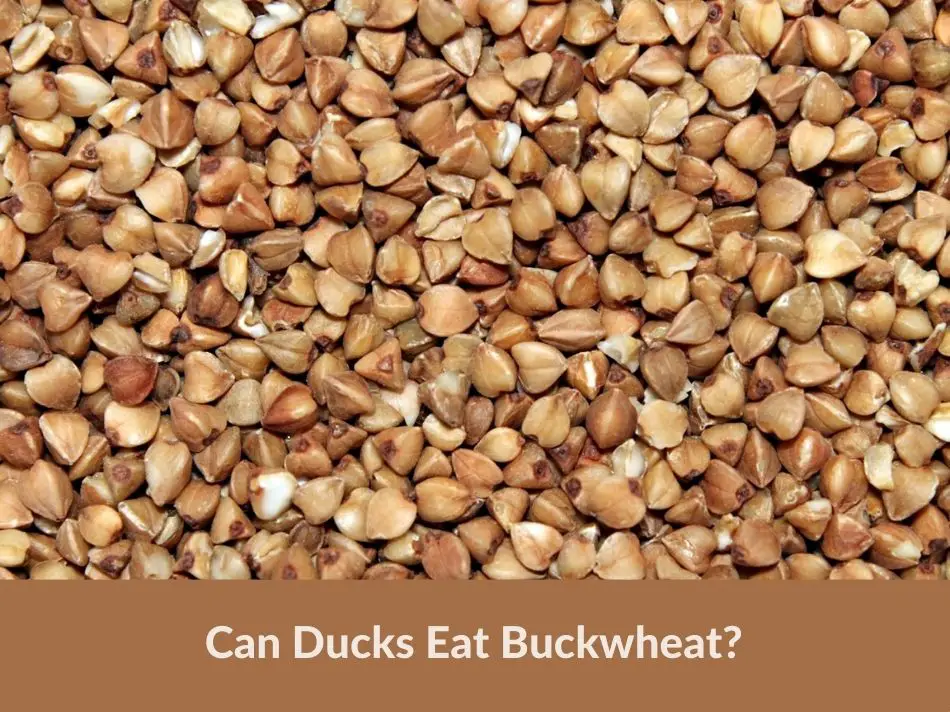Ducks are omnivores, meaning their diet consists of a mix of plant-based and animal-based foods. They often eat corn, lettuce, peas and grains. But, can ducks eat buckwheat?
Yes, ducks can eat buckwheat. It’s rich in nutrients and can benefit a duck’s health.
In this comprehensive article, you’ll discover more about ducks eating buckwheat and how it fits into their overall diet. We delve into the nutritional components and health benefits of buckwheat and some guidelines for feeding buckwheat to ducks
What is Buckwheat?
Before diving into whether ducks can consume buckwheat, it’s essential to understand what this plant is. Native to Northern Europe and Asia, buckwheat is primarily grown for its grain-like seeds.
Its seeds are rich in protein, fiber, and various minerals such as magnesium, manganese, and phosphorus. The plant is gluten-free, which makes it a good choice for those with gluten intolerances. Its seeds can be consumed in various forms, including whole groats, flour, and flakes.
Is Buckwheat Healthy For Ducks?
One of the critical aspects to consider when determining the suitability of a particular food for ducks is its nutritional content. Buckwheat stands out as a rich source of nutrients that are essential for ducks’ well-being. It has high levels of protein, which is crucial for feather growth and muscle development.
The fiber content aids in digestion, while the presence of essential minerals contributes to bone health and metabolic processes.
Feeding ducks buckwheat can offer numerous health benefits:
- High Protein Content: Essential for growth, particularly in ducklings.
- Rich in Fiber: Aids in proper digestion and nutrient absorption.
- Essential Minerals: Support bone development and other physiological functions.
- Antioxidants: Includes Rutin, which has anti-inflammatory properties.
Potential Risks
Although buckwheat presents an array of nutritional benefits, it also comes with its set of risks. One of the main concerns is its potential for causing digestive issues if fed in large quantities. Its fiber and protein content can be beneficial but can also become problematic when consumed in excess.
Moreover, the buckwheat hulls could be a choking hazard, so it’s essential to serve it in a form that is easy for the ducks to eat, like crushed or milled buckwheat.
How To Feed Ducks Buckwheat
Incorporating buckwheat into your ducks’ diet can be a rewarding experience for both you and your feathered friends, provided you do it right. Here is a detailed step-by-step guide to feed ducks buckwheat safely and effectively.
Preparing the Buckwheat
- Choose the Right Form: Buckwheat is available in various forms such as whole groats, flour, and flakes. For ducks, whole groats are generally preferred, but you can also use crushed or milled buckwheat.
- Cook the Groats: If you are using whole groats, it’s recommended to cook them first to make them more digestible for ducks. Boil them in water for about 15-20 minutes until they become soft. Drain excess water and let them cool down before feeding.
- Crushing or Milling: If you prefer not to cook the buckwheat, consider crushing or milling the groats. This makes it easier for the ducks to consume and digest them.
- Inspect for Hulls: Make sure to remove any hulls or hard outer coverings which could be a choking hazard.
Portion Sizes
- Start Small: Introduce buckwheat in small amounts initially. You can start with a tablespoon for each duck and observe how they react to it.
- Balance It Out: Buckwheat should only be a part of a balanced diet, making up no more than 10-20% of the overall food intake. Make sure to complement it with other grains, vegetables, and specially formulated duck feed.
Feeding Procedure
- Mix It In: Blend the prepared buckwheat with the regular duck feed. This encourages a balanced meal and ensures that the ducks don’t just pick out the buckwheat.
- Feed Separately: If you prefer, you can also offer buckwheat separately in a shallow feeding bowl. Just make sure to monitor how much each duck is consuming.
- Clean Access: Always ensure that the ducks have access to clean, fresh water, particularly when introducing new food items like buckwheat that might require extra effort to digest.
Additional Tips
- Frequency: Feed adult ducks buckwheat not more than 2-3 times a week, while ducklings can consume it more frequently in smaller quantities.
- Avoid Overfeeding: Excess buckwheat can lead to digestive problems, so it’s crucial to maintain moderation.
- Watch for Allergies: Though rare, some ducks might be allergic to certain grains or seeds. Always introduce new food items one at a time and monitor for any adverse reactions.
By following these steps and best practices, you can introduce buckwheat into your ducks’ diet safely and enjoy the health benefits it offers. Always remember that a balanced diet is key to the well-being of your ducks. Therefore, buckwheat should be a supplement to their diet and not a replacement for other essential foods.
More Grains & Vegetables Ducks Can Eat
Ducks can consume a variety of grains and vegetables as part of a balanced diet. While grains like rice and oats provide essential carbohydrates and fiber, vegetables like carrots, lettuce, and peas offer crucial vitamins and minerals.
Expand your knowledge on duck-friendly feeds by exploring our list of healthy grains ducks can eat.
Conclusion
The answer to whether ducks can eat buckwheat is a resounding yes, but with caveats. Buckwheat is packed with proteins, essential minerals, and fiber, which are all beneficial for a duck’s health. The answer to whether ducks can eat buckwheat is a resounding yes, but with caveats.
Buckwheat is packed with proteins, essential minerals, and fiber, which are all beneficial for a duck’s health.
Disclaimer: The information in this article is for informational purposes only. I'm not an expert or a veterinarian.


